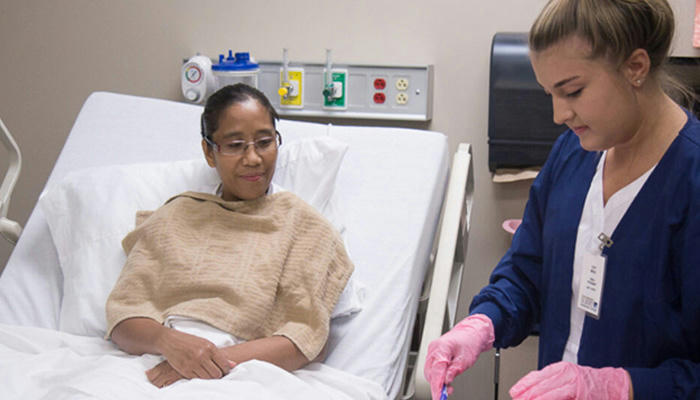What will I learn in My CNA course?
A Certified Nursing Assistant (CNA) course trains individuals to provide basic care in healthcare settings, covering essential nursing skills, medical terminology, and patient care procedures. CNAs work closely with registered nurses to assist with activities of daily living, monitor patient health, and provide emotional support. Completing a CNA course is a crucial step towards a career in healthcare, offering individuals the opportunity to make a meaningful difference in the lives of patients.
Importance of CNA certification

Certified Nursing Assistant (CNA) certification is essential for individuals looking to work in the healthcare field as it demonstrates competency in providing quality care to patients. Certification is often a legal requirement in many states and is preferred by employers in healthcare settings. It opens up job opportunities, promotes career advancement, ensures patient safety, and requires ongoing education to stay current with industry standards. Obtaining CNA certification signifies a commitment to professionalism and helps individuals establish themselves as competent and skilled healthcare professionals.
Overview of CNA Course Curriculum

The Certified Nursing Assistant (CNA) course curriculum provides a comprehensive foundation in basic nursing skills essential for providing quality patient care. This segment of the training program focuses on fundamental skills such as vital signs monitoring, infection control, personal care assistance, and patient hygiene. Students learn proper techniques for transferring patients safely, maintaining a clean and sterile environment, and communicating effectively with healthcare team members.
In addition to these skills, the Basic Nursing Skills module also covers topics such as mobility assistance, nutrition and hydration support, and recognizing changes in a patient's condition. Students are trained to observe and report any abnormalities or concerns to the nursing staff promptly. This hands-on training equips aspiring CNAs with the knowledge and practice necessary to deliver compassionate and competent care to patients in various healthcare settings.
By mastering these foundational nursing skills, CNAs play a crucial role in supporting patients' well-being and assisting healthcare teams in providing comprehensive and effective care. The Basic Nursing Skills module sets the groundwork for CNAs to build upon as they continue their education and training in the field of nursing.
Hands-On Training

Clinical Skills are a vital component of a Certified Nursing Assistant (CNA) program, offering students the opportunity to apply theoretical knowledge in real-world healthcare settings. This aspect of training focuses on developing practical skills like patient positioning, wound care, medication administration, and assisting with medical procedures.
In the Clinical Skills portion of the program, students have the chance to work directly with patients, applying their classroom learning to real-life situations. This hands-on experience allows students to practice their skills in a supervised environment, ensuring that they are providing safe and effective care to patients. By working alongside experienced healthcare professionals, students can observe best practices, receive feedback, and refine their techniques.
Engaging in clinical experiences helps students build confidence in their abilities and develop the critical thinking and problem-solving skills necessary for success as CNAs. It also allows them to develop strong communication and teamwork skills, as they collaborate with other healthcare providers to deliver comprehensive care to patients. Through these interactive learning opportunities, students enhance their clinical competencies and prepare themselves for the challenges and rewards of a career in the healthcare field.
Classroom Instruction
A. Anatomy and Physiology
Understanding the human body: Students delve into the structure and function of the human body, including organs, tissues, and systems, to develop a foundational knowledge of anatomy and physiology.
Identifying basic body systems: Students learn to identify and understand the major body systems, such as the cardiovascular, respiratory, and musculoskeletal systems, to better comprehend how they work together to maintain health.
B. Ethical and Legal Considerations
Patient confidentiality: Students learn about the importance of maintaining patient privacy and confidentiality in healthcare settings, as well as the legal implications of breaching patient confidentiality.
Following regulations and protocols: Students are taught to adhere to ethical standards, regulations, and protocols in healthcare practice to ensure the safety and well-being of patients and uphold professional standards.
Certification Exam Preparation
To prepare for the CNA certification exam, focus on reviewing course material, taking practice tests, studying from a CNA exam study guide, attending review sessions, studying in groups, managing your time effectively, focusing on weak areas, practicing hands-on skills, and staying calm and confident on exam day. By following these tips and dedicating time to study and practice, you can increase your chances of passing the exam and becoming a certified nursing assistant.
Completing a Certified Nursing Assistant (CNA) course offers numerous benefits, including increased job opportunities in various healthcare settings, job security due to the growing demand for CNAs, the chance to start an entry-level healthcare career, hands-on experience working directly with patients, personal fulfillment from helping others, opportunities for professional development and lifelong learning, competitive salary potential with benefits, and potential for career advancement in the healthcare field.
